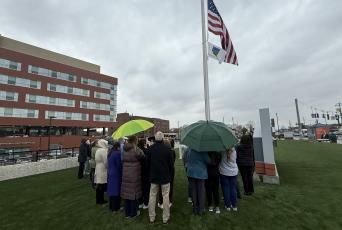
Breast Cancer Treatment
UHS provides those diagnosed with breast cancer access to comprehensive care, state-of-the-art technology and a multispecialty team to coordinate the best breast cancer treatment options for you in New York's Southern Tier. Some brief information is provided below about several treatment options available at UHS. This information may be helpful when you speak with your healthcare provider.
The treatment options available to you will depend on a number of factors including:
- The type of tumor
- The extent of the disease at the time of diagnosis
- Your age
- Your medical history
Your personal feelings about treatment, your self-image, your family history and your lifestyle will also be important considerations in your healthcare provider’s assessment and recommendations. You and your physician should discuss these treatment methods and how they apply to your situation. Understanding all your options from the beginning of your diagnosis allows you to have all of the information you need to make an informed and rational decision about your New York breast cancer treatment from UHS.
Lumpectomy
During a lumpectomy, both the tumor and a wedge of normal tissue surrounding the cancer are removed. A margin of normal tissue must be cut out to ensure the tumor has been completely removed. Lumpectomy is followed by approximately 6 weeks of radiation therapy administered at our breast cancer treatment center in New York's Southern Tier.
Mastectomy
Mastectomy is the surgical removal of the breast; it refers to a number of different procedures, including modified radical mastectomy, total (or simple) mastectomy, nipple-sparing mastectomy and radical mastectomy. Based on the size and location of the mass in your breast, your surgeon will recommend the type of surgery that offers you the best chance of successful treatment.
Sentinel Lymph Node Biopsy
Sentinel node biopsy is a surgical procedure used to determine if cancer has spread beyond a primary tumor into your lymphatic system. Sentinel node biopsy involves injecting a tracer material that helps locate the sentinel nodes during surgery. The sentinel nodes are removed and analyzed by a pathologist.
Axillary Node Dissection
Axillary node dissection involves removing at least 6 of the lymph nodes under the arm. These nodes are then sent to a pathologist to be checked for cancer.
Radiation Therapy
Radiationtherapy (also called radiotherapy) uses high-energy rays to kill cancer cells. It affects cells only in the part of the body that is treated. Radiation therapy may be used as a part of our breast cancer treatment in New York after surgery to destroy breast cancer cells that remain in the area.
Chemotherapy
Chemotherapy uses drugs to kill cancer cells. The drugs that treat breast cancer are usually given through a vein (intravenous) or as a pill. Most women receive a combination of drugs. The side effects of chemotherapy depend mainly on which drugs are given and how much. Chemotherapy kills fast-growing cancer cells, but the drugs can also harm normal cells that divide rapidly.
Hormone Therapy
Hormone therapy is also called anti-hormone treatment. If lab tests show that the tumor in your breast has hormone receptors, then hormone therapy may be an option. Hormone therapy keeps cancer cells from getting or using the natural hormones (estrogen and progesterone) they need to grow.
-
 Know where to go for your medical concernApril 14, 2025
Know where to go for your medical concernApril 14, 2025It can be tough to distinguish where to go for medical care when your symptoms feel unbearable, and your primary care provider is unavailable. Here are some key differences to help you decide.
-
 Guided by instinct, healed by expertise — orthopedic care close to homeApril 14, 2025
Guided by instinct, healed by expertise — orthopedic care close to homeApril 14, 2025Ever since she was a little girl, Kaylee Goodspeed has been involved in cheerleading. However, as she grew older, she started developing issues with her knees that, if not cared for properly, could have caused problems in the future. With her mother’s advocacy and an expert team of UHS Orthopedic surgeons, Kaylee is now cheering, tumbling and living a normal life once again.
-
 Flag-raising held to commemorate Donate Life MonthApril 10, 2025
Flag-raising held to commemorate Donate Life MonthApril 10, 2025UHS held a flag-raising ceremony at UHS Wilson Medical Center on April 10 to commemorate National Donate Life Month, a celebration of those who have given the gift of life through organ, eye and tissue donation.
-
 Empty Bowls event raises over $8,000 to support hunger reliefApril 10, 2025
Empty Bowls event raises over $8,000 to support hunger reliefApril 10, 2025A huge THANK YOU to everyone who attended the 2025 Empty Bowl Events and showed their support for hunger relief in our area. or every ticket sold, the Food Bank provides 75 meals to the hungry in the Southern Tier!


